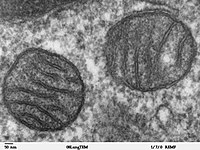
Photo from wikipedia
Pyruvate metabolism, a key pathway in glycolysis and oxidative phosphorylation, is crucial for energy homeostasis and mitochondrial quality control (MQC), including fusion/fission dynamics and mitophagy. Alterations in pyruvate flux and… Click to show full abstract
Pyruvate metabolism, a key pathway in glycolysis and oxidative phosphorylation, is crucial for energy homeostasis and mitochondrial quality control (MQC), including fusion/fission dynamics and mitophagy. Alterations in pyruvate flux and MQC are associated with reactive oxygen species accumulation and Ca2+ flux into the mitochondria, which can induce mitochondrial ultrastructural changes, mitochondrial dysfunction and metabolic dysregulation. Perturbations in MQC are emerging as a central mechanism for the pathogenesis of various metabolic diseases, such as neurodegenerative diseases, diabetes and insulin resistance-related diseases. Mitochondrial Ca2+ regulates the pyruvate dehydrogenase complex (PDC), which is central to pyruvate metabolism, by promoting its dephosphorylation. Increase of pyruvate dehydrogenase kinase (PDK) is associated with perturbation of mitochondria-associated membranes (MAMs) function and Ca2+ flux. Pyruvate metabolism also plays an important role in immune cell activation and function, dysregulation of which also leads to insulin resistance and inflammatory disease. Pyruvate metabolism affects macrophage polarization, mitochondrial dynamics and MAM formation, which are critical in determining macrophage function and immune response. MAMs and MQCs have also been intensively studied in macrophage and T cell immunity. Metabolic reprogramming connected with pyruvate metabolism, mitochondrial dynamics and MAM formation are important to macrophages polarization (M1/M2) and function. T cell differentiation is also directly linked to pyruvate metabolism, with inhibition of pyruvate oxidation by PDKs promoting proinflammatory T cell polarization. This article provides a brief review on the emerging role of pyruvate metabolism in MQC and MAM function, and how dysfunction in these processes leads to metabolic and inflammatory diseases.
Journal Title: Molecules and Cells
Year Published: 2023
Link to full text (if available)
Share on Social Media: Sign Up to like & get
recommendations!